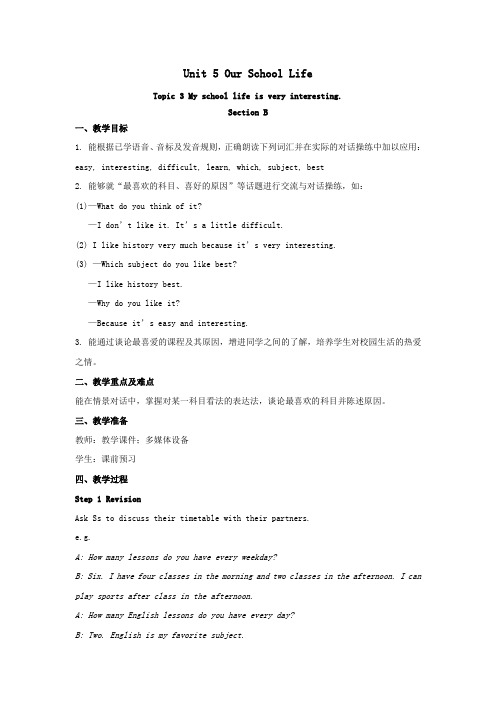(完整版)仁爱英语七年级下册unit5_topic3教材讲解
- 格式:doc
- 大小:42.51 KB
- 文档页数:5


七年级下Unit 5重点全解Unit 5 School LifeTopic 3 my school life is very interesting一. 重点词汇:一)星期名词:Sunday, Monday, Tuesday, Wednesday, Thursday, Friday, Saturday二)学科名词:Chinese, math, English, geography, biology, history, P.E., science, art, politics, physics, music三)相关形容词:easy, interesting, difficult, boring, useful, hard, wonderful四)相关动词:learn,study五)其他名词:meeting, subject, sound, night, attention, February.二、重点短语:1. do outdoor activities 做户外活动indoor activities室内活动2. draw pictures 画画3. work on math problems 解答数学问题;work on 致力于…,专心于…4. learn about the past 学习了解过去5. a student of Class 1, Grade 7一个七年一班的学生6. some other subjects 一些其他课程other作为形容词,用在名词或代词之前7. be kind to 对…友好8.Have a music class.上音乐课9.at ten fifty 在十点五十分10.be over (=finish) 结束11.on+星期名词在星期几12.outdoor activities 户外活动13. learn about the past 了解历史14. it’s time for …=it’s time to do sth. 该干…了15. play with sb 和某人玩耍Play with sth玩弄某物16.swim in the swimming pool 在游泳池游泳17.draw pictures 画画18. every Tuesday and Thursday 每周二和周四19.tell sb sth=tell sth to sb 把某事告诉某人20. learn sth from 从…学到…21. hard work 辛勤工作22. thank sb for sth/ thank sb. for doing sth因某事而感谢某人23. try to do my best 试图尽我的最大努力24. care about 关心,担忧25. read stories 读故事三、重点句型讲解1 询问星期几用What day…?回答:It’s Wednesday/Sunday…。



Unit5 topic3语法及写作©目标导航【答案】—1. meeting 2. difficult 3. best 4. boring 5. mathematics 6. having?, activities9.night10.studies 11. friendly 12. late二 1 .outdoor activity 2. easy and interesting 3. difficult and boring 4. between.. leam(...)from...8. hard .and...5.6.learn about the past7. learn about8. learn by oneselfP. from...to... 10. tell sb. about sth语法mustn't 一May I take the magazine out of the reading room?2. —Whose cap is this? Is it Cindy's? be hers. Don't you remember she even didivt come to the parly?3.—Will you slay here for dinner with us? My mother is waiting for me at home.be6.—Where is Monica? I can't find her anywhere.be in the library. She loves reading books when she is free.8. Ants are pretty small. You might think that they might not know is that ants are actually very strong for their size.考查情态动词辨析。

Unit 5 Our School LifeTopic 3 My school life is very interesting.Section B一、教学目标1. 能根据已学语音、音标及发音规则,正确朗读下列词汇并在实际的对话操练中加以应用:easy, interesting, difficult, learn, which, subject, best2. 能够就“最喜欢的科目、喜好的原因”等话题进行交流与对话操练,如:(1)—What do you think of it?—I don’t like it. It’s a little difficult.(2) I like history very much because it’s very interesting.(3) —Which subject do you like best?—I like history best.—Why do you like it?—Because it’s easy and interesting.3. 能通过谈论最喜爱的课程及其原因,增进同学之间的了解,培养学生对校园生活的热爱之情。
二、教学重点及难点能在情景对话中,掌握对某一科目看法的表达法,谈论最喜欢的科目并陈述原因。
三、教学准备教师:教学课件;多媒体设备学生:课前预习四、教学过程Step 1 RevisionAsk Ss to discuss their timetable with their partners.e.g.A: How many lessons do you have every weekday?B: Six. I have four classes in the morning and two classes in the afternoon. I can play sports after class in the afternoon.A: How many English lessons do you have every day?B: Two. English is my favorite subject....【设计意图】复习上节课所讲内容。
Unit 5 Topic 3I 重点词汇和短语today, Monday, Tuesday, Wednesday, Thursday, Friday, Saturday, Sunday, lesson, subject, Chinese, math, English, politics, history, geography, biology, physics, science, art, P.E., learn, activity, meeting, easy, difficult, interesting, boring, which, best, other, friendly, news, attention, stamp, between, world, night, program, place, February, newspaper, hard, wish, storyoutdoor activity, work on, fro m…to…,II 语言点Section A1.---What day is it today? 今天是星期几?---It’s Wednesday. 今天是星期三。
对星期几提问,用what day …?回答用:It’s + 星期(Monday/Tuesday/…)对日期提问,则用What’s the date today?2. What time does the class begin? 几点上课?与When does the class begin? 意思相同。
--- What time does the class begin? 几点钟上课--- At ten o’clock. 10 点。
What time常对具体的几点几分进行提问; 而when 的使用围更广, 可以对年、月、日、几时几分等进行提问。
另外, when 还可以用作连词, 表示“当…….的时候”。
语法精讲:现在进行时1. 现在进行时的构成:Am/is/ are+ v-ing是现在进行时的构成形式v-ing现在分词的构成:一般情况+ing falling以不发音字母e结尾的单词去e, +ing having双写词尾字母+ing putting 以重读闭音节结尾的单词,末尾只有一个辅音字母时.2. 现在进行时的基本用法1) 表示说话时正在进行的动作常和now连用,有时用一个动词如look(看)、listen(听)来表示now(现在)这一时间概念。
Look! A train is coming.看!火车来了Listen! He is playing the piano.听!他在弹钢琴。
2) 表示现阶段正在进行着的动作但不一定是说话时正在进行。
常和at present(目前)、this week(本周)、these days(这几天)等时间状语连用。
What lesson are you studying this week?你们本周学哪一课了?(说话时并不在学)3) 现在进行时有时可用来表示一个在最近按计划或安排要进行的动作即是说可以用来代替将来时,但此时,一般要与表示将来的时间状语连用,而且仅限于少量动词。
如:go(去)、come(来)、leave(离开)、start(开始)、arrive(到达)、return(返回)、sleep(睡觉)……Are you going to Tianjing tomorrow?你明天去天津吗?How many of you are Coming to the party next week?你们有多少人下周要来参加晚会?4) be going to+动词原形这一句型表示即将发生的事或打算(准备)做的事,我们把它归在将来时里了。
(详见第十章将来时)She isn't going to speak at the meeting. 她不打算在会议上发言。
注意:如果没有表示将来时间的状语,此类句子就可能指现在或现阶段的动作。
Unit5 Topic3 SectionA 精品教案I. Material analysis本节课是第五单元的话题三的第一课时,谈论有关学校课程安排的话题,学习有关课程安排的表达,以及个人对课程的喜好和看法的相关用语,在此基础上了解中西方校园生活文化的差异,并注意培养健康的学习习惯。
本课的主要活动是1a和3a。
通过Helen和Jane谈论星期、最喜欢的科目及询问上下课时间的对话呈现主要教学内容,学习关于科目的词汇和课程时间安排的句型。
此外,学生还将通过听说掌握字母组合ear, eir/ere, eer, gh, ght的发音规则,同时训练学生辨音的能力。
本课贴近学生的学习实际,因此,教师可引导学生结合自己的课程表来进行口头和笔头操练,提高学生学习的兴趣,调动他们的学习积极性。
II. Teaching aims1.Knowledge aims能根据已学语音、音标及发音规则,正确朗读下列词汇并在实际的对话操练中加以应用:Wednesday, Monday, Tuesday, Thursday, Friday, physics, geography, P.E., physical education, art, history, math, mathematics, biology, politics, science, meeting 能够在小组合作活动中,掌握字母组合ear, eir/ere, eer, gh, ght的发音规则并尝试辨音;能够在口头和书面表达中,复习和区分现在进行时及一般现在时的用法;能够就“谈论校园生活、课程及时间表”的话题进行交流与对话操练,如:(1) —What class are they having?—They are having a music class.(2) —How many lessons does he have every weekday?—Five.(3) —What time does the next class begin?—At ten fifty-five.2.Skill aims能听懂有关学校课程安排的简单对话或叙述;能够运用所学句型谈论学校课程安排;能在口头表达中做到发音清晰、语音语调准确;能正确朗读对话,注意语音语调和节奏;能写出常见的课程名称和星期等名词;能正确书写与本话题表达有关的学校课程安排和对课程的评价的语句。
Unit 5 Our School LifeTopic 3 My school life is very interesting一. 重难点讲解1、What day is it today? 今天星期几?--It is Wednesday. 今天星期三。
What day……?用来询问星期几或是节日。
回答:It is……Eg: What day is it today? 今天是什么节日?It’s Children’s Day.今天是儿童节。
在星期几用介词on . Eg: on Wednesday. 周三2、What class are they having? 他们正在上什么课?--They are having a music class. 他们正在上音乐课。
= Which class are they having?(1)What class 用来询问“什么课程”= which class class=lessonEg: Morning classes/lessons begin at eight o’clock.Class: ①班级。
Eg: What class are you in? – I am in Class Seven.②一个班级的全体学生。
此时是一个集合名词。
Eg: Good morning, class!(2)have a music class/lesson. 上音乐课Eg:We are having an English class/lesson. 我们在上英语课。
3、What time is it over?几点下课?be over 结束(指状态)= end 结束;完成(强调动作)Eg:What time does it end? 几点结束?4、Working on math problems.解数学题work on 从事……;致力于……(根据多种语境可以有多种译法)Eg:He is working on a new novel. 他正在写一部小说。
My father works on a farm. 我爸爸在农场工作He is working on computers. 他正在用电脑。
He is outside and working on the car. .他在外边修汽车。
work out 算出;计算。
Eg: The little boy can work out the math problem all by him self.这个小男孩能自己算出这道数学题。
5、They are learing about the past in the class.他们在课堂上了解过去。
(1)learn about 了解We learn English ,but we don’t learn about English.我们学习英语但我们不了解英语。
(2)learn = study学习(但learn 侧重于强调学习的成果“学会,学到“学习具体的事情要用learn, 如:learn English ;study 还有钻研,研究的意思,表示研究性的学习,强调学习的过程)Eg: They are studying history.learn to do sth 学做某事Eg:let’s learn to speak English.6、You must like English very much. 你一定非常喜欢英语。
must 表肯定的猜测。
“一定……”Eg: That book must be Jane’s, because her name is on it.那本书一定是简的,因为她的名字在上面。
can’t be “不可能……”表否定的猜测Eg: That bike over there can’t be Jane’s,Hers is new.那边的自行车不可能是简的。
她的是新的。
7、What do you think of it? 你认为它怎样?--Sometimes it’s difficult and boring , so I don’t like it very much.有时难学且乏味,所以我不太喜欢(1)What do you think of ……? 你认为……怎么样?(表示主人对某人或某物的看法)可用how do you like……? 此句还有询问对某物的喜欢程度Eg: What do you think of the book? 你觉得这本书怎样?---It is very intersting .非常有趣。
=How do you like the book?How do you like China? 你有多喜欢中国。
---Very much. 非常喜欢。
(2)very much = a lot “非常”表程度Eg: I like playing basketball very much.= I like playing basketball a lot.8、What’s your favorite subject? 你最喜欢什么科目?=Which subject do you like best?what’s one’s favorite ……?=which …… do/does sb like best? 某人最喜欢什么?What’s your favorite sport?= Which sport do you like best?9、Why don’t you like it?你问什么不喜欢它?Why don’t you +动词原形?“你为什么不…….?”此句型还可以用来提出建议,= why not…..? “为何不……呢?”Eg: Why don’t you play soccer with us? = Why not play soccer with us?为何不跟我们一起去踢球呢?10、At school , my tearchers and classmates are very friendly to me.在学校,我的老师和同学对我很友好。
be friendly to sd. 对某人友好friendly 在此为形容词“友好的,友善的” = kindEg: Everyone here is very friendly to us. 这里的每个人对我们都很友好。
= Everyone here is very kind to us.11、I study Chinese,English,politics,art,history,geography,biology and some other subjects.我学习语文,英语,政治,美术,历史,地理,生物和一些其他的课程。
(1)当指在学校学习各门功课时study=learnLearn①通过练习或教师指导而记住或学会;I’m learning to skate. 我在学滑冰。
②向某人学习,从……中学习We should learn from each other.我们应该相互学习。
③教与学并提Men learn while they teach. 教学相长。
Study 指用功学,钻研,研究Eg:He always studies math. 他总是学习数学。
(2)other 形容词,“另外的,其他的”表示泛指,常与名词复数和不可数名词连用。
Eg:I see John with some other boys.我看见约翰和其他一些男孩在一起。
如果other 前有the,this,any,each,every,no,none以及形容词性物主代词时,后面只加单数名词。
Eg:I have no other place to go. 我没有地方可去。
①the other 表示两者中的另外一个,可单独使用也可接单数名词。
Eg: He has two pencils. One is short,the other is long.他有两只铅笔,一只是短的,另外一只是长的。
②others 是other的复数形式,意为‘别的人或物’,表示泛指。
如:If you work hard.you will catch up with others soon.如果你努力学习,你很快会赶上别人的。
12、Attention,please!Here is the news.请注意,这儿有消息告诉大家。
①Attention,please!是书面或口头通知的常用语,目的在于提醒别人注意。
②News意为“消息,新闻”是不可数名词。
Eg: a piece of news 一则新闻或消息。
What’s the latest news?有什么新消息吗?13、There is a soccer game between Class One and Class Two on the playground at 5:00 thisafternoon. 今天下午五点,一班和二班将在操场上举行一场足球赛。
Between是介词,意为“在……之间”,一般指两者之间。
Between…and…是介词短语,意为“在……和……..之间。
Eg: The chair is between the bed and the desk.那张椅子在床铺好桌子之间。
(1)指三者或三者以上的人或物中每两者之间,仍用between.Eg: She takes some medicine between three meals every day.她每天在两餐之间吃药。
(2)当涉及边界时指两个以上国家之间Eg: Switzerland is between France,Italy,Austria and Germany.瑞士位于法国,意大利,奥地利及德国之间。
14、Do you want to see the stamps of the world? 你想看看世界邮票吗?World 名词,“世界”All over the world = around the world 全世界15、speak English = say ……in English 用英语说……Eg: My sister can’t speak English. 我的妹妹不会讲英语。
My sister can’t say the pen in English. 我的妹妹不会用英语讲钢笔。
16、Thank you for your hard work!谢谢你的努力工作。
(1)thank you / thanks for sth/doing sth. 为某事或坐某事而感谢。